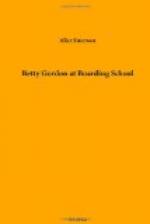Teddy, the “light Tucker twin,” nodded in confirmation.
“I suppose we have to be educated,” he admitted, with the air of one making a generous concession to public opinion, “but I don’t see why they find it necessary to prolong the agony. Any one who can read and write can make a living.”
“Perhaps your father hopes you’ll do a bit more than that,” suggested Mr. Littell slyly.
This effectually silenced the twins, for their wealthy father was a splendid scientist who had made several explorations that had contributed materially to the knowledge of the scientific world, and he had lost the sight of one eye in a laboratory experiment undertaken to advance the cause for which he labored.
The Littell car carried the twelve to the station soon after breakfast, and though Shadyside and Salsette, unlike many of the large northern schools, ran no “special,” the few passengers who were not school bound found themselves decidedly in the minority on the “9:36 local” that morning.
“Remember, Betty, you and Bob are to spend the holidays with us,” said Mrs. Littell, as she kissed her good-bye. “If your uncle comes down from Canada, he must come, too.”
“All aboard!” shouted the conductor, who foresaw a lively trip. “No’m, you can’t go through the gate—nobody can.”
The crowd of fathers and mothers and younger brothers and sisters pressed close to the iron grating as the train got under way. On the back platform the Tucker twins raised their voices in a school yell that would have horrified the dignified heads of the Academy had they been there to hear it.
CHAPTER IX
ADJUSTER TOMMY
“I’m Salsette born!” trilled Tommy Tucker soulfully.
“And Salsette bred!” chimed in his brother
“And when I die—” caroled Tommy.
“I’ll be Salsette dead!” they finished together.
Then, highly satisfied with this intelligible ditty, they burst into the car where the others were waiting for them.
The boys had appropriated the seats at the forward end of the car, and unfortunately their selection included a seat in which an elderly, or so she seemed to them, woman sat. She fidgeted incessantly, folding and unfolding her long traveling coat, opening and closing a fitted lunch basket, and arranging and re-arranging several small unwieldy parcels and heavy books that slid persistently to the floor with the jarring of the train. When the conductor came through for tickets, she discovered that she had mislaid hers and it was necessary to flutter the pages of every book before the missing bit of pasteboard finally dropped from between the leaves of the last one opened.
Bob, with instinctive courtesy, had offered to help her search, but she had rebuffed him sharply.
“I don’t want any boy pawing over my belongings,” she informed him tartly.




